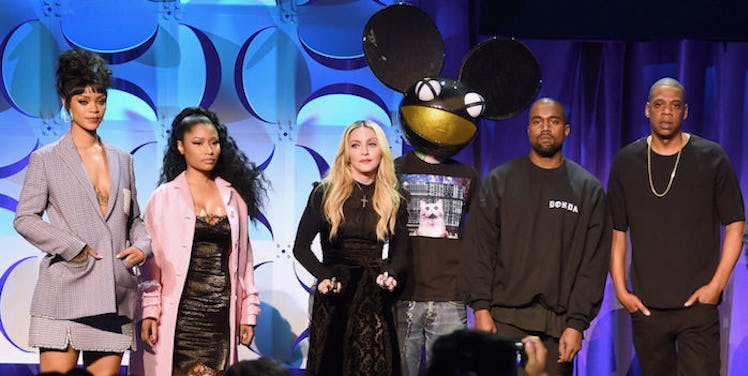
Tidal Should Change The Future Of Music, But It Probably Won't
A couple months ago, Jay Z bought a Scandinavian version of Spotify for $56 million with the intent of making a monthly music service that would pay its artists.
This comes in the face of the infamously low cuts given out by current stream hubs, and the grand larceny of music by sites like Pirate Bay.
If the trend continues, artists will make next to no money when they release new music. Album sales are a thing of the past.
Kendrick's To Pimp A Butterfly is looking at about 500k copies in its first two weeks.
In comparison, when Kanye was at a similar stage in his career with Graduation, he sold almost a million records in the first six days.
One could make the argument Kendrick is less popular than Graduation Ye. But, K-Dot broke the Spotify streaming record twice in a row on the first two days of his album's availability, with nearly 10 million streams on both days.
The album has been universally praised, but people aren't buying. Even in Kendrick's hometown of Los Angeles, with a population of 3.8 million, only 35,000 copies were sold -- that's less than 1 percent.
Clearly, if you're a musician, seeing a top star struggle to make album money would be quite troubling.
Enter Tidal: the finished product of Jay Z's purchase.
The streaming service will work a lot like Spotify, Google, Amazon, Pandora, iTunes or Soundcloud, but the big difference is the service is backed and owned by artists.
At the announcement, Jay Z brought most of the Illuminati (obvious assumption). Artists present included Kanye, Bey, Nicki Minaj, Jack White, Arcade Fire, Rihanna and Daft Punk to show widespread support.
It was like "We Are The World," but more selfish.
The music community is behind this move; the motives sound right, and Jay Z is a cool guy. Okay, I'm in. So, how much is it gonna cost?
It's $10 a month for the standard quality streams, and $20 a month for CD quality sound. (What's 20 bucks to a mothaf*cka like me can you please remind me?)
Hov's service is like buying two albums every month, all year, into eternity. C'mon, man.
Tidal is asking people to pay more for music than ever before, when people aren't paying anything for music. But, despite its bougie pricing, Tidal does recognize music's landscape.
Some hipsters and dinosaurs still buy physical copies of music, but the exponential growth of music online gave fans a taste for trying things out. We don't have to take a risk on buying a wack album; we can stream it first.
Kendrick may have broken the Spotify record, but he was not going to do an unprecedented multimillion in sales in his first two days. A lot of those streams were from casual listeners who would never buy Lamar's record, but wanted to check it out.
This is music now. It's like we're in Costco, but everything is a free sample. We have been spoiled by the endless supply and variety of music online; our thirst is unquenchable. If we paid for all our music, we'd be broke.
Tidal is a line in the sand that will likely get washed away by the impossible competition of free music.
But, we know music shouldn't be free. It's ridiculous that an exceptional person pours themselves into a piece of art for months, and we take it from them without paying.
It's difficult to nail down what music should cost, but it should not be free. Although $20 a month seems ridiculous, out of the context of accessibility, the fee is a bargain to hear any song ever made, whenever we want.
Adjust for inflation, and offer that to someone from the 80s and they'd lose their mind.
Music has gotten to an abusive place. Yes, most of the artists who announced Tidal do not need album money. They make the GDP of a small country from one tour.
But, lesser-knowns who can't support themselves on tours alone need that money. You're not willing to pay $15 for their latest album, but isn't $1 or $2 as part of a larger monthly fee a fair price to check their stuff out?
Putting a price on something we are used to getting for free is tricky.
As those, "You wouldn't download a car" PSAs have made obvious, what we are doing is stealing. But, we're comfortable with the theft because getting caught is such a remote possibility.
Tidal's success depends on people's willingness to pay for music again. Its offering of higher quality sound will likely only attract the most advanced music lovers. To be successful, they need to change minds on a grander scale.
Obviously, with free music entrenched, this shift will take a long time.
But, for those who feel sticky about ripping music from the web, Tidal offers the moral security that what you are doing is fair.
As Jay Z said:
"I just want to be an alternative. They don’t have to lose for me to win."